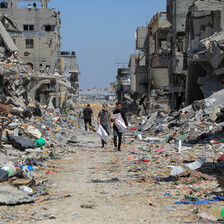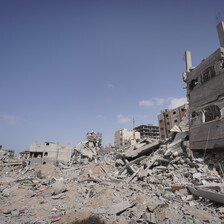The Electronic Intifada 4 August 2025

Very little food can be bought in Gaza.
APA imagesI can barely function as a journalist and I can’t even explain why.
I am a fact-checking journalist. My job is to sit in front of my laptop and debunk false and misleading claims.
Now as I sit, trying to type a word, my fingers freeze, and my brain refuses to connect one sentence to the next.
This has been the issue for the past four months, ever since my family began surviving solely on lentils – no bread, no sweets, not even spices. Just salt.
Now, nearly five months after Israel announced its complete aid blockade on 2 March, food is barely found in the markets.
Even the animal feed that people resorted to eating during the severe food crisis in the early months of 2024 is now unavailable.
My body has become weak over these months, losing 7 kilograms – weight I never wanted to lose. Skin on bones; this is what we are right now.
By July, things had collapsed even more.
I could only manage to undertake five fact-checking tasks. My goal in more “normal” times is to complete 17-20 such tasks per month.
The few tasks I managed to complete, I then submitted late. As a matter of principle, I try to avoid being late under all circumstances.
I couldn’t bring myself to tell my editors the truth – that I was starving. Instead, I blamed the internet connection.
Worsening health
In early July, I fact-checked a claim made by the pro-Israel publication Gazawood, which is known for denying all of Gaza’s suffering.
It had been publishing material denying that there is a food crisis in Gaza. The claims were accompanied by videos of the barely functioning restaurants in Gaza.
With an empty stomach, I visited the restaurants in question. I found them empty of customers.
An owner of a restaurant showed me the restaurant’s fridge. It was completely empty.
After I headed home, I intended to complete my investigation and submit it. I had all the necessary details and photographs as evidence.
All that was left was to put it together and submit it, a task that normally takes me no more than two hours.
I sat, tried to type, couldn’t focus – gave up.
I repeated the process.
The two hours it should have taken me for that task turned into four days. Four days of useless attempts to focus.
Attempts to ignore the hunger pangs and the constant thoughts of food.
But what I am enduring in this round of the food crisis is not the only reason why I cannot work. Several previous rounds of the crisis have pushed me to this edge.
Just days before the January truce – when we suffered from a severe lack of food – I would often stagger during a typical workday, overwhelmed by waves of dizziness.
I was an evacuee at the time, living in a tent in Khan Younis, southern Gaza.
My friend, who felt the same, pushed me to go to Al-Amal Hospital so that we could get our blood tested.
Showing up just to do a blood test, I felt deeply ashamed among the crowds of wounded people and their families.
After my friend and I had our blood tested, her hemoglobin level was 9 grams per deciliter.
Mine was 7.5.
Seeing the number worsened my headache. In September 2023 – a month before the war began – I had a hemoglobin count of 14.
The doctor told me then that I needed to follow up with a specialist and recommended that I stop eating chocolate and drinking instant coffee.
Israel has forced me to follow that recommendation strictly throughout the war.
Collapse
As days in July passed, my health worsened. Ultimately, I collapsed before I realized what was happening.
In an interview by Al Jazeera’s The Stream program about the Gaza Humanitarian Foundation, I talked about how every day I see Gazans with pale faces, fainting from starvation.
I made those observations with grief choking me. I felt grief for all the people I saw falling down on the street.
But I did not expect that I would shortly be one of the people that others would pity.
After I was done, I headed home with an empty stomach and a sharp headache – mostly because of hypoglycemia, low blood sugar.
Three women stopped me on the way. Two told me that I should get myself a piece of bread, whatever the price.
I tried to take the advice but I did not even find one person selling bread or biscuits. Another old woman stopped me in the street and asked me if I was fasting.
“Fasting at such a time?” I asked, not understanding her point. She told me that I seemed like I was about to fall.
“I wish I had something to give you, daughter,” she continued in an apologetic tone, recommending that I take deep breaths and walk slowly.
I did not understand what she meant until I reached the door of my house, and all my strength had failed me. Unable to knock on the door, I just leaned on it.
I could not hear anything but the buzzing in my ear.
My mom found me slumped at the door.
She woke me and urged me to come inside to eat: five falafel balls made from lentils. No vegetables. No bread.
As I ate, I thought of the work I had not finished. I resolved to fight the fatigue and complete my work.
But my mom startled me by saying that I needed to pack my bag and get ready to flee the area.
“The civil defense urged all of the people in the tents near us to evacuate today,” she said, as I was eating and taking a sip of tea to give the fake feeling of having a full stomach.
How would I flee when I can’t even finish a sentence?
I remembered all the fatigue I had previously experienced at times of evacuation. The memory forced me to declare that I was not going anywhere.
I then sat helplessly in front of my laptop and resumed the grim task of trying to write my sentences – and connect them.
Eman Hillis is a journalist in Gaza.





